Sen. Sherrod Brown was one of just four Democrats to vote against moving the Lieberman-Warner Climate Security Act to a floor vote last year, but this year he says he won’t block climate legislation. “I’m not going to be part of a filibuster on climate change,” Brown said recently.
Last year’s bill never had much of a chance, and Brown was not satisfied that it would protect manufacturing. He signed a letter from 10 swing-vote Democrats explaining why they opposed the bill. Shortly after his “no” vote, he said, “I am committed 100 percent to passing a robust cap-and-trade policy. I could not settle for this legislation because it may hurt my state … I would introduce a bill that would combat global warming without hurting families.”
He seems to have more confidence in the cap-and-trade bill that the House passed this year. “I thought that Waxman was unbelievably adept,” Brown said, referring to the chair of the House Energy and Commerce Committee who ushered the bill through.
Brown’s main concern is how a climate bill would affect the economy in his coal-reliant home state, which has a heavy manufacturing base. The House bill would impose trade penalties on countries that don’t limit their greenhouse-gas emissions, but Brown says even stronger trade protections are needed. “This bill doesn’t pass if it doesn’t take care of manufacturing,” he said. “And I don’t think you can fully take care of manufacturing without some border equalization.” That puts him at odds with President Obama, who criticized the House bill’s border adjustment measures as being too “protectionist.”
 Track the debate and take action >>>
Track the debate and take action >>>
“I don’t think the strategy is set on how you get to 60 yet until we figure out how you get Midwestern senators that are interested in manufacturing to support climate change [legislation],” Brown said recently. “I have close to a 16-year, 100 percent environmental record. And I want to support this bill, but it’s got to protect manufacturing. Because if we don’t, it’s worse for global warming.”
Brown voted not to rule out using the budget process to pass climate legislation earlier this year. He also joined this year with fellow swing-voter Evan Bayh (D-Ind.) to introduce a bill that would direct the secretary of energy to study ways to improve the competitiveness of energy-intensive manufacturing under clean-energy and climate-change policy. If a measure like that were included in a climate bill, it might help get Brown on board.
Do you know more about this senator’s stance on climate legislation? Tell us.
Find out about other senators by clicking on their names in the right column.




